2021-2022学年人教版英语中考复习之七年级下册 Units 9~12课件(共124张PPT)
文档属性
| 名称 | 2021-2022学年人教版英语中考复习之七年级下册 Units 9~12课件(共124张PPT) | 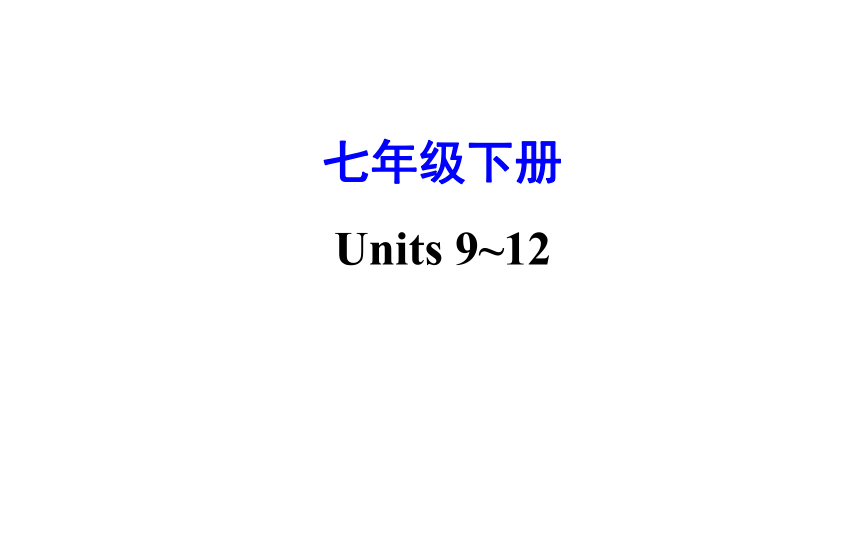 | |
| 格式 | ppt | ||
| 文件大小 | 1.7MB | ||
| 资源类型 | 教案 | ||
| 版本资源 | 人教新目标(Go for it)版 | ||
| 科目 | 英语 | ||
| 更新时间 | 2021-07-28 16:43:31 | ||
图片预览

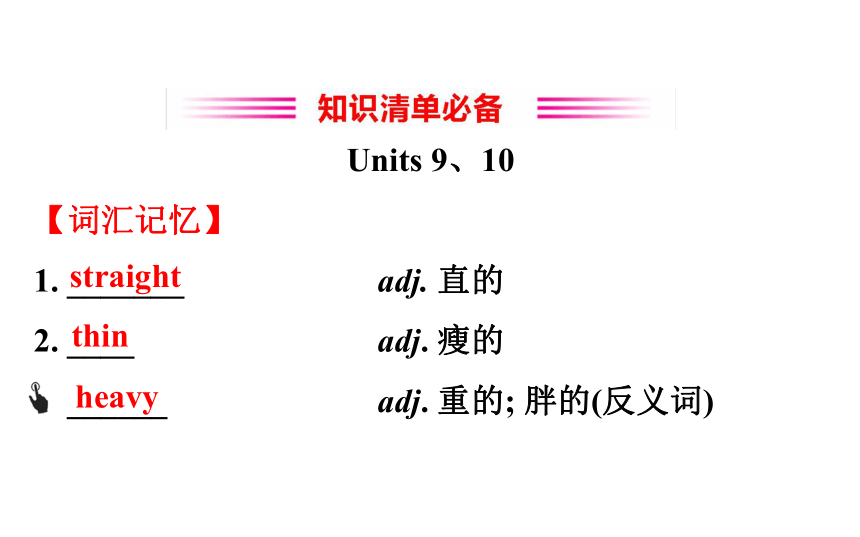
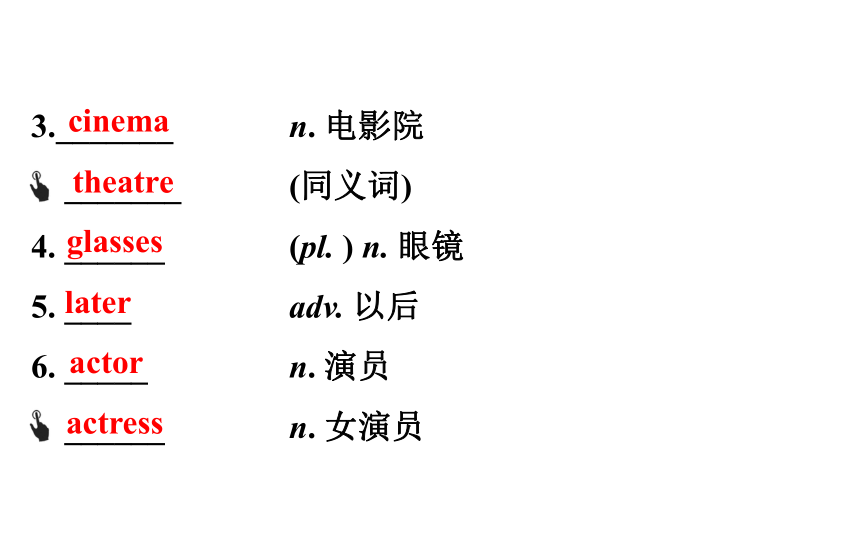
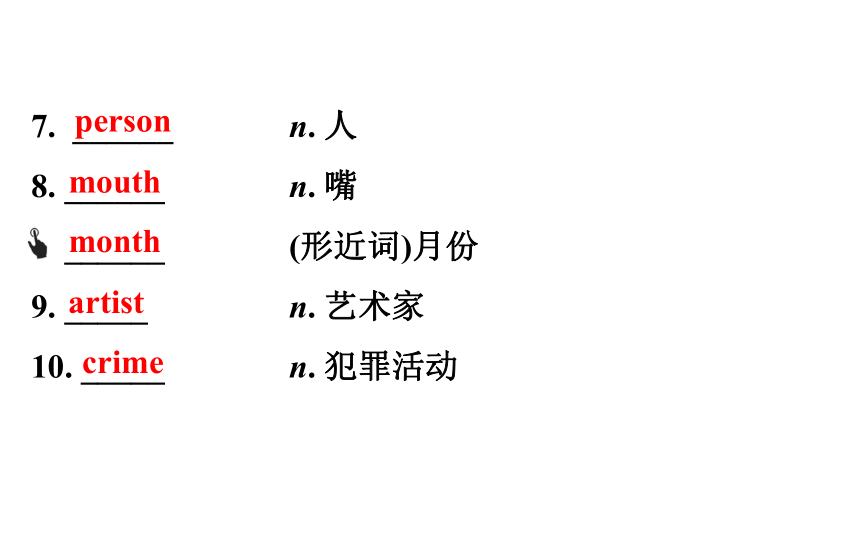
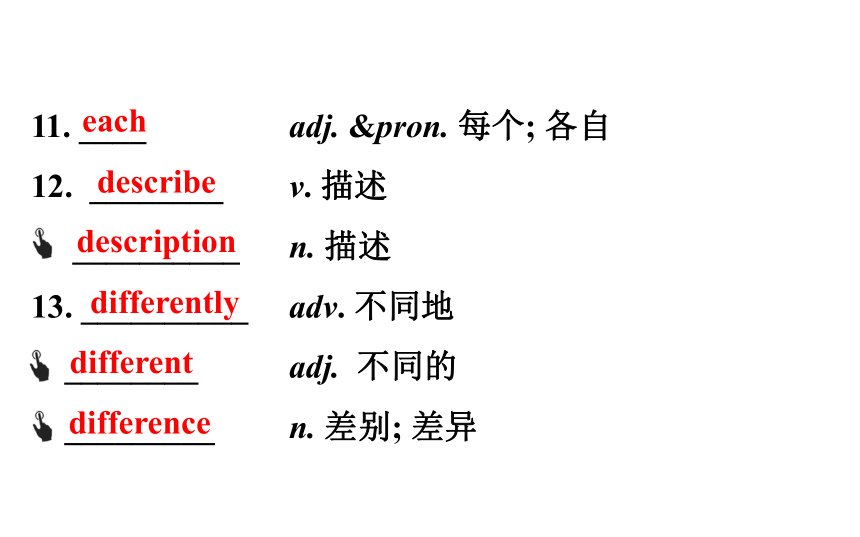
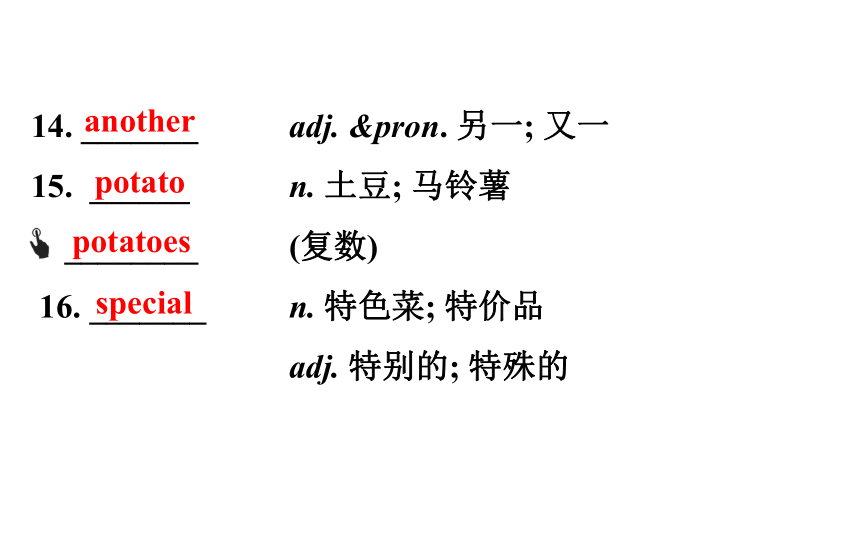
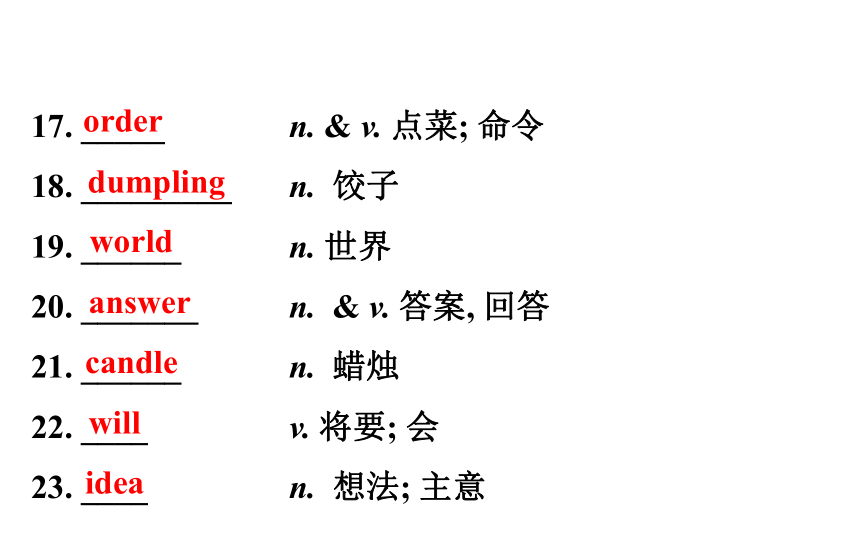
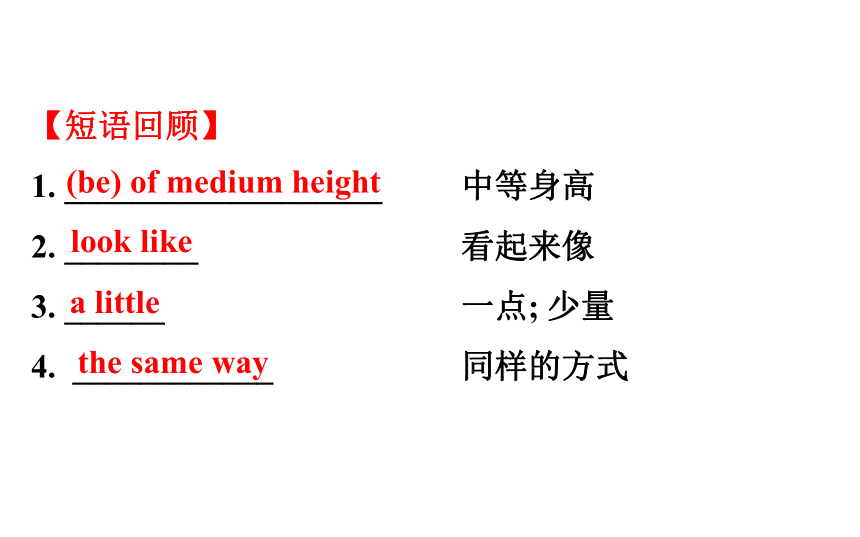
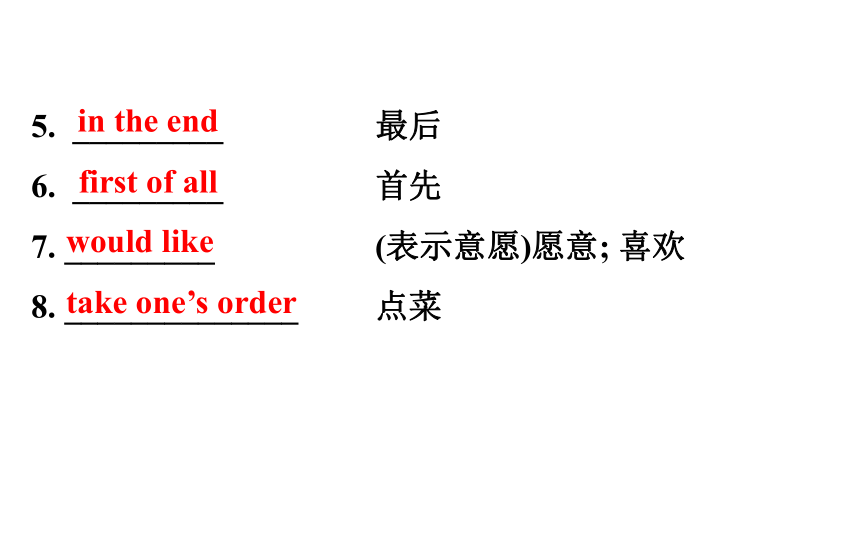
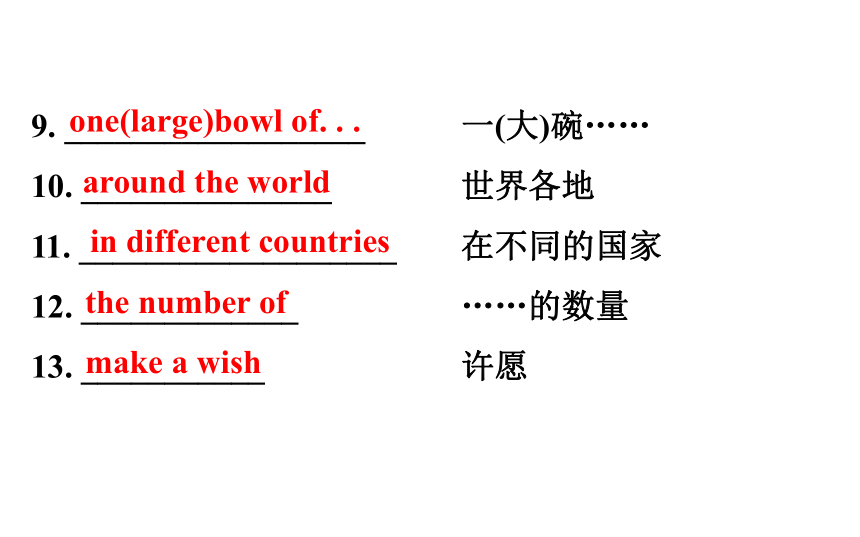
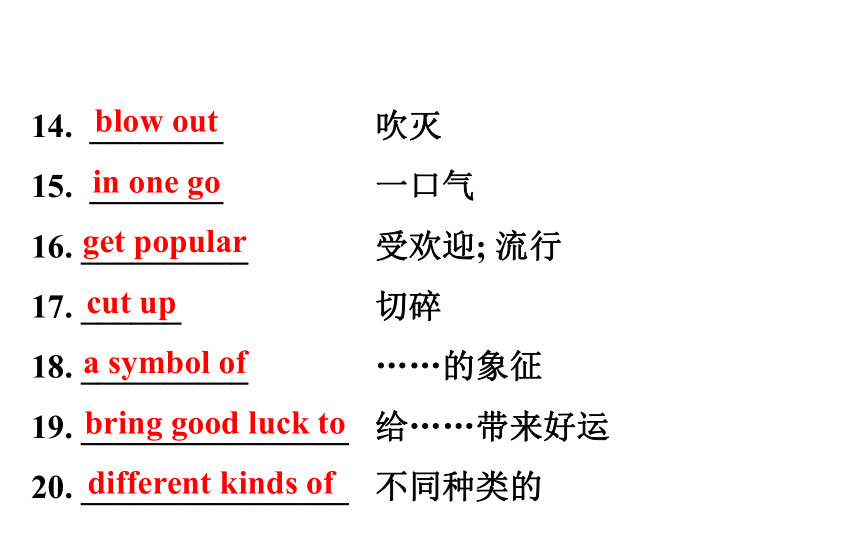
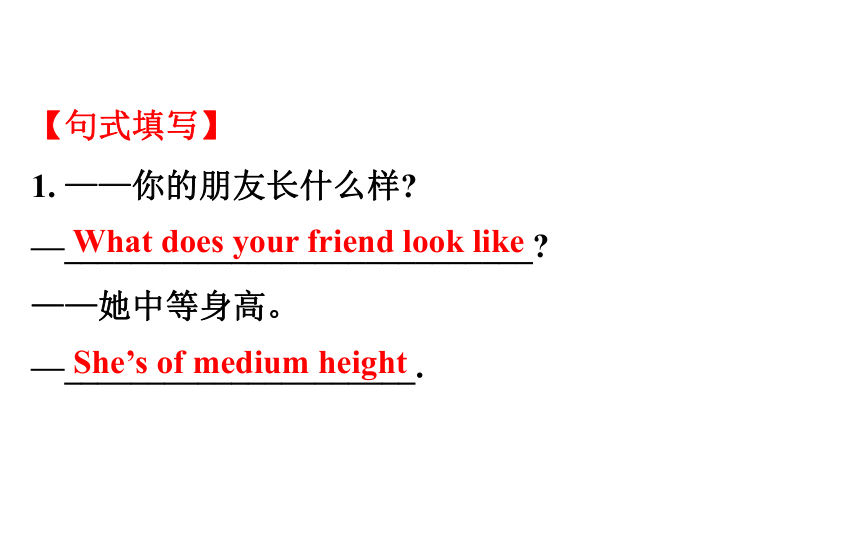
文档简介
七年级下册
Units 9~12
Units 9、10
【词汇记忆】
1. _______ adj. 直的
2. ____ adj. 瘦的
______ adj. 重的; 胖的(反义词)
straight
thin
heavy
3._______ n. 电影院
_______ (同义词)
4. ______ (pl. ) n. 眼镜
5. ____ adv. 以后
6. _____ n. 演员
______ n. 女演员
cinema
theatre
glasses
later
actor
actress
7. ______ n. 人?
8. ______ n. 嘴
______ (形近词)月份
9. _____ n. 艺术家
10. _____ n. 犯罪活动
person
mouth
month
artist
crime
11. ____ adj. &pron. 每个; 各自
12. ________ v. 描述 ?
__________ n. 描述?
13. __________ adv. 不同地
________? adj. 不同的
_________ n. 差别; 差异
each
describe
description
differently
different
difference
14. _______ adj. &pron. 另一; 又一
15. ______ n. 土豆; 马铃薯 ?
________ (复数)
16. _______ n. 特色菜; 特价品
adj. 特别的; 特殊的
another
potato
potatoes
special
17. _____ n. & v. 点菜; 命令
18. _________ n. 饺子
19. ______ n. 世界
20. _______ n. & v. 答案, 回答
21. ______ n. 蜡烛
22. ____ v. 将要; 会
23. ____ n. 想法; 主意
order
dumpling
world
answer
candle
will
idea
【短语回顾】
1. ___________________ 中等身高 ?
2. ________ 看起来像?
3. ______ 一点; 少量?
4. ____________ 同样的方式 ?
(be) of medium height
look like
a little
the same way
5. _________ 最后 ?
6. _________ 首先?
7. _________ (表示意愿)愿意; 喜欢?
8. ______________ 点菜 ?
in the end
first of all
would like
take one’s order
9. __________________ 一(大)碗……?
10. _______________ 世界各地?
11. ___________________ 在不同的国家 ?
12. _____________ ……的数量?
13. ___________ 许愿 ?
one(large)bowl of. . .
around the world
in different countries
the number of?
make a wish
14. ________ 吹灭 ?
15. ________ 一口气 ?
16. __________? 受欢迎; 流行?
17. ______ 切碎?
18. __________ ……的象征?
19. ________________ 给……带来好运?
20. ________________ 不同种类的 ?
blow out
in one go
get popular
cut up
a symbol of
bring good luck to
different kinds of?
【句式填写】
1. ——你的朋友长什么样?
—____________________________? ?
——她中等身高。
—_____________________. ?
What does your friend look like
She’s of medium height
2. ——他们留着直发还是卷发?
—___ they _____ straight __ curly hair?
——他们留着卷发。
—_________curly hair. ?
Do
have
or
They have
3. ——你要多大碗的?
—______________________? ?
——我要中碗的。
—_______a medium bowl, please. ?
What size would you like
I’d like
4. ——你要什么种类的面条?
—____________noodles would you like? ?
——我想要牛肉面。
—I’d like ___________, please. ?
What kind of
beef noodles
5. 过生日人们想吃什么?
What ______ people _________on their birthday? ?
would
like to eat
Units 11~12
【词汇记忆】
1. ____ v. 喂养; 饲养
______ (过去式/过去分词)
2. ______ n. 农民; 农场主
_____ n. 农场v. 务农; 种田
feed
fed/fed
farmer
farm
3. _____ v. 种植; 生长; 发育
_____ (过去式)
______ (过去分词)
4. ____ v. 采; 摘
5. ________ adj. 极好的; 优秀的
grow
grew
grown
pick
excellent
6. _________ adv. 昨天
7. ______ n. 花
8. ______ v. &n. 担心; 担忧
9. ________? n. 博物馆
10. ________ n. 油画; 绘画
yesterday?
flower
worry
museum
painting
11. _______? adj. 使人兴奋的; 令人激动的 ?
_______ adj. 兴奋的; 激动的
12. _________ adj. 昂贵的
13. ______ adj. 廉价的; 便宜的?
_______ adv. 廉价地; 便宜地
exciting
excited?
expensive
cheap
cheaply
14. ____ adj. 缓慢的; 迟缓的
______ adv. 缓慢地; 迟缓地
15. _____ n. 机器人
16. _____ n. 导游; 向导
17. __________ pron. 所有事物; 一切
slow
slowly
robot
guide
everything
18. ____ v. 听到; 听见
______ (过去式)?
19. ______ n. 海滩; 沙滩
20. _____ n. 羊; 绵羊
_____ (复数)
hear
heard
beach
sheep
sheep
21._______ adj. 自然的
______ n. 自然
22. ______ n. 老鼠; 耗子
____ (复数)
23. ________ n. 语言
natural
nature
mouse
mice
language
24. _____ n. 印度?
______ adj. 印度的 n. 印度人
25. _______ n. 惊奇; 惊讶 v. 使吃惊
___________ adj. 惊奇的; 惊讶的
_________ adj. 使人惊奇的
India
Indian
surprise
surprised
surprising
26. _____ v. 跳; 跃?
27. _____ v. 弄醒; 醒
______ adj. 醒着的
28. _____ n. 森林
jump
wake?
awake
forest
【短语回顾】
1. __________ 给奶牛挤奶?
2. ___________ 骑马 ?
3. ____________ 喂鸡?
4. _______________ 许多?
milk a cow
ride a horse
feed chickens
quite a lot(of. . . )
5. ________________ 在乡下, 在农村 ?
6. _______ 总的说来?
7. ______________ 对……感兴趣 ?
8. __________ 深夜不睡, 熬夜?
in the countryside
all in all
be interested in
stay up late
9. _________ 跑开 ?
10. __________ 冲……大声叫嚷?
11. ________? 放风筝?
12. ______ 搭起; 举起?
run away
shout at. . .
fly a kite
put up
13. _________ 互相; 彼此?
14. ____________ 吃惊?
15. __________ 对……大声喊叫?
16. ____________ 上上下下, 起伏 ?
17. __________ 把……弄醒
each other
get a surprise
shout to. . .
up and down
wake. . . up
【句式填写】
1. 昨天你骑马了吗?
____ you ____ a horse yesterday?
2. 你上周的旅行怎么样?
_____ ____ your trip last week?
Did
ride
How
was
3. 我们乘坐火车很快就到了那里。
We _________________ there so fast ___ _____.
4. 我一点儿也不喜欢这次旅行。
I ______ like the trip __ ___.
got/reached/arrived
by
train
didn’t
at
all
5. ——上周末你们做什么了?
—_____ ___ you ___ last weekend?
——我们去划船了。
—We _____ _______.
What
did
do
went
boating
6. ——上周末她去哪里了?
—______ ___ she ___ last weekend?
——她去农场了。
—She _____ __ the farm.
Where
did
go
went
to
7. 我那么累以至于很早就睡着了。
I was __ tired ____ I went to sleep early. ?
so
that
1. What does your friend look like? 你的朋友长什么样? (Unit 9, P49)?
?What do/ does. . . look like? ……长什么样?
【测考点】
(1)My father is _____________. (对画线部分提问)?
_____ ____ your father ____ ____?
tall and heavy
What
does
look
like
(2)完成句子。
①我的妈妈戴着眼镜, 留着长发。
My mother _____ ______ and has long hair.
②她又矮又胖, 但是长着大大的眼睛。 世纪金榜导
学号
She is short and fat, but she ___ ___ ____.
wears
glasses
has
big
eyes
【巧归纳】
(1)询问人物外貌特征, 常用句式:
What do/does + sb. + look like?
(2)回答时, 常用以下句式:
①Sb. + wear(s) +glasses/clothes. . .
②Sb. +has/have (+a/an) + 形容词 +名词.
③Sb. + be+ of medium height.
④Sb. + be +(描述外貌特征的)形容词.
【警示】 wear通常用于描述穿着; have/has通常用于描述头发、脸型、五官等; be通常用于描述身高、体形等。
2. . . . but I may be a little late. ……可是我可能要晚一点。(Unit 9, P50) ?
?a little 一点; 少量
【测考点】
(1)完成句子。
①我几乎没有钱, 但我哥哥有一点钱。
I have ____ money but my brother has ______money. ?
little
a little
②他有点儿瘦。
He is ______thin. ?
③架子上有相当多的书, 但是对我来说几乎没有一本
是有用的。
There are _______________books on the shelf, but
____ of them are useful to me. ?
a little
quite a few/many
few
( )(2)(2019·武威、白银中考)Father was so busy
with his work that he had _________time to read the
newspaper. ?
A. some B. little
C. much D. a bit of
B
【辨不同】 little, a little, few, a few
肯定意义
否定意义
所修饰名词
a little 一点
little 几乎没有
不可数名词
a few 一些; 几个
few 几乎没有
可数名词
*There is little bread at home; let’s buy a little.
家里几乎没有面包了, 我们去买一点儿吧。
*A few people took the driving test, but few passed it.
一些人参加了驾驶考试, 但是几乎没人通过。
3. I’d like the beef noodles. 我想要牛肉面。(Unit 10, P55)?
?would like (表示意愿)愿意; 喜欢
【测考点】
(1)Do you want to travel with me this summer vacation?
(改为同义句)
______ you ____ __ _____ with me this summer
vacation?
Would
like
to
travel
( )(2)—Would you like something to eat?
—_________. I’m not hungry. ?
A. Yes, please B. Not at all
C. No, thanks D. Good idea
C
( )(3)(2019·宿迁中考)—Would you like to go to
Shanghai Disneyland with me in July?
— ?
A. Yes, I’d like to. B. It doesn’t matter.
C. Have a good time! D. You’re welcome.
A
(4)用所给词的适当形式填空。
①She is patient with everyone. Whenever you ask her
questions, she would like _______(reply). ?
②He isn’t feeling well and he doesn’t feel like ______
(eat) anything. .三
to reply
eating
【巧归纳】
(1)would like的常见用法
①would like to do sth. =want to do sth. 想要做某事
②would like sb. to do sth. =want sb. to do sth. 想要某人做某事
③Would you like sth. ? 你想要某物吗? (客气请求)
肯定答语: Yes, please. 否定答语: No, thanks.
④Would you like to do sth. ? 你愿意做某事吗? (表示邀请、建议)
肯定答语: Yes, I’d like/love to.
否定答语: I’d love to, but. . .
(2)would like/want/feel like辨析
would like
=want
①would like(=want), 后接名词、不定式或复合宾语;
②would like比want语气更委婉
feel like
后接名词或动词-ing形式
4. The number of candles is the person’s age. 蜡烛的数量就是这个人的年龄。(Unit 10, P59)?
? the number of. . . ……的数量
【测考点】
(1)完成句子。
①A great number of engineers ___ _______(正在等候)
in the hall to get their prizes.
②中国老年人的数目在增加。 .
____ _______ __ the old people is increasing in China.
are
waiting
The
number
of
( )(2)(2018·天水中考)—The number of tourists
_________over 33 million this year. ?
—Yes. A large number of tourists _________so far
because of the new look of our city. ?
A. is; have come
B. is; has come
C. are; has come
D. are; have come
A
【辨不同】
the number of与a number of的区别
the number of
……的数量;
……的数目
后接名词的复数形式, 作主语时, 谓语动词用单数形式
a number of
许多; 大量
常用来修饰可数名词, 作主语时, 谓语动词用复数形式
*A number of students are playing in the playground. The number of the students is thirty.
许多学生在操场上玩。学生的数目是三十。
5. If he or she blows out all the candles in one go, the wish will come true.
如果他(她)一口气把蜡烛全部吹灭的话, 许的愿望便会成真。(Unit 10, P59)
?if conj. 如果
【测考点】
(1)完成句子。
①如果我明年有足够的钱, 我将去英国参观。
__ I _____ enough money next year, I ____ ____
England.
If
have
will
visit
②如果明天不下雨, 我们就去远足。
__ it _______ ____ tomorrow, we ____ ___hiking.
If
doesn’t
rain
will
go
( )(2)(2018·资阳中考)We will achieve our
China Dream _________we work hard and never give
up. ?
A. and B. so C. if D. but
C
( )(3)I don’t know if Eric _________this Sunday.
If he _________here, I’ll call you at once. ?
A. will come; will come
B. come; comes
C. comes; will come
D. will come; comes
D
【巧归纳】if的两种含义
if
如
果
引导条件
状语从句
主句使用一般将来时, 从句常用一般现在时
是
否
引导宾语
从句
(=whether)
①主句是一般现在时, 从句根据具体情况使用相应时态
②主句是一般过去时, 从句使用相对应的过去时态
【助记】
if条件句不一般, 几个要点记心间:
条件句, 放在前, 逗号要放句中间。
条件句, 表可能, 主句多用将来时。
6. All in all, it was an exciting day. 总之, 这是令人兴奋的一天。(Unit 11, P65)
?exciting adj. 令人兴奋的; 使人激动的
【测考点】
(1)用excite的适当形式填空。
①I got an _______ piece of work.
②The story is very _______.
③We were all ______ at the news.
④I only take on work that ______ me, even if it means
turning down lots of money.
exciting
exciting
excited
excites
( )(2) (2018·龙东中考)We are _________about
the _________news that Beijing will hold the Winter
Olympics in 2022. ?
A. excited; exciting B. exciting; excited
C. excited; excite .
A
【辨不同】excited, exciting 与excite
excited
主语通常是人。意为“兴奋的; 激动的”, be excited about意为“对……感到兴奋”
exciting
作表语或定语, 主语通常是物。意为“使人兴奋的; 令人激动的”
excite
动词, 意为“使……兴奋; 激动”
Everyone was excited when they heard the exciting news.
听到这个令人兴奋的消息时, 大家都很激动。
7. I didn’t like the trip at all. 我一点也不喜欢这次旅行。(Unit 11, P65)?
?not . . . at all 一点也不; 根本不
【测考点】
(1)完成句子。
①我根本不喜欢吃苹果。
I _____ like eating apples __ ___.
don’t
at
all
②——非常感谢您能和我们交谈。
——不客气。
—Thank you very much for speaking with us.
—____________________________________. ?
Not at all. /You’re welcome. /My pleasure
( )(2)—It’s a little cold. Would you mind closing
the window?
—_________. I will do it right away. 世纪金榜导
学号?
A. Forget it B. No, you can’t
C. Not at all D. Of course
C
【巧归纳】
(1) not. . . at all “ 一点也不…… ”, 常用在否定句中, 加强语气。
(2)not at all三种含义:
①用来回答感谢, 意为“不用谢; 不客气”。
—Thank you very much. 多谢你了。
—Not at all. 不客气。
②用来回答带有感谢性质的客套话, 意为“没什么”。
—You are very kind. 你真好。
—Not at all. 没什么。
③用来回答道歉, 意为“没关系”。
—I’m sorry I’m late. 对不起, 我迟到了。
—Oh, not at all. 噢, 没关系。
8. But I was so tired that I went to sleep early. 但是我太累了, 所以我早早地睡着了。(Unit 12, P71)
? so . . . that 如此……以至于……
【测考点】
(1)完成句子。
①(2018·绥化中考)My sister isn’t old enough to dress
herself. (改为同义句)
My sister is __ young ____ she can’t dress herself.
so
that
②他学习如此努力以至于他很快就赶上了其他学生。
He worked __ hard ____ he caught up with other
students quickly.
③她是如此好的一位老师以至于我们都喜爱她。
She is __ good a teacher ____ we all love her.
so
that
so
that
( )(2)(2018·咸宁中考)—Harry Potter
is_________ an interesting novel _________I want to
read it again. ?
— I agree with you. .
A. so; that B. too; to
C. such; that D. as; as
C
【辨不同】so. . . that. . . , so that, such. . . that. . . 的辨析
so. . .
that. . .
(1)so+形容词/副词+that从句
(2)so+形容词+a/an+可数名词单数+that从句
(3)so many/few/much/little+名词+that从句
so that
意为“以便于; 目的是”, 引导目的状语从
句, 此时可与in order that 换用; 从句中
常使用can/could/may/might/will/would/should
等情态动词, 主从句间没有逗号相隔
意为“因此, 所以”, 引导结果状语从句,
此时不能与in order that 换用; 主从句
之间可有逗号相隔
such. . .
that. . .
意为“如此……以至于……”, 引导结果状语从句, 其结构为such+a/an+形容词+名词+that从句
9. The next morning, my sister and I got a terrible surprise. 第二天早上, 我和姐姐大吃一惊。(Unit 12, P71)
? surprise n. 惊奇; 惊讶 v. 使吃惊
【测考点】
(1)用所给单词的适当形式填空。
①(2018·北部湾中考) Everyone was _________
(surprise) to see her at the party last night. ?
surprised
②To everyone’s _______(surprise), the plan made a
great success at last.
③The local economy developed at a _________
(surprise)speed.
surprise
surprising
(2)那两个人惊奇地互相看着。 .
The two men looked at each other __ _______.
( )(3)—Look at the girl in the square!
—Oh. I’m _________that a three-year-old girl can
dance so well! ?
A. surprise B. surprising
C. surprised
in
surprise
C
【辨不同】surprise, surprised, surprising
surprise
作动词, 意为“使(某人)惊奇或吃惊”。
作名词, 意为“惊奇; 惊讶”, 常用短语
为: to one’s surprise令某人吃惊的是;
get a surprise吃惊; in surprise惊奇地
surprised
作形容词, 意为“对……感到惊奇”, 主语习惯上是人
surprising
作形容词, 意为“令人惊奇的”, 可作表语或定语, 主语习惯上是“物”
语法点一 would like的用法
考点1: 句式变化。
考点2: 一般疑问句及回答。
【即时冲关】
Ⅰ. 完成句子
1. ——先生, 你想要点什么?
—__________________, sir? ?
——我想要一杯咖啡。
—_______a cup of coffee, please. ?
What would you like
I’d like
2. 我们想要你和我们一起离开。
We _________you _______with us. ?
would like
to leave
3. ——你想吃什么, 草莓还是香蕉?
—______________________________________
________? ?
——一些草莓吧。
—Some strawberries, please.
What would you like to eat, strawberries or
bananas
Ⅱ. 单项选择
( )1. —Would you like some water?
—_________. I’m thirsty. ?
A. Yes, please B. No way
C. No, thanks D. All right
A
( )2. —Would you like to go to the movies with us
this weekend? .
— _________. I can’t wait. ?
A. That’s all right B. Of course not
C. Yes, I’d love to D. What a pity
C
语法点二 一般过去时
→见语法精讲强化篇P197
考点1: 动词过去式的变化规则。
考点2: 一般过去时的句式变化。
考点3: 常用时间状语。
【即时冲关】
Ⅰ. 用括号内所给动词的适当形式填空
1. She usually ____ (get) up at half past six in the
morning, but she ___ (get) up at six this morning.
gets
got
2. Tom ______(break) your cup last night.
3. I _______ (buy) some bread on my way to school
yesterday.
broke
bought
4. I remembered Jim ____ (is) good at playing the
piano.
5. My grandmother ____(tell) me this story when I
____ (be) 7 years old.
was
told
was
Ⅱ. 句型转换
1. He visited his grandparents last weekend. (改为否定
句)
He ______ ____ his grandparents last weekend.
2. Our trip to Hangzhou was really great. (对画线部
分提问)?
_____ ____ your trip to Hangzhou?
didn’t
visit
How
was
3. They took lots of photos there. (改为一般疑问句)
____ they ____ lots of photos there?
4. She went boating last Sunday. (对画线部分提问)?
What ___ she ___ last Sunday?
Did
take
did
do
5. I went to the beach with my family last summer
vacation. (对画线部分提问)?
___________ ___ you ___ to the beach with last summer
vacation?
Who/Whom
did
go
话题——学校旅行
考查角度
1. 旅行前的准备情况: 旅行的目的地、时间、出行方式等。
2. 介绍旅行中的注意事项、旅行中的活动等。
3. 介绍旅行的感受和收获等。
考查频次
★★★★★
【写作佳句】
亮点句式
1. I traveled to the Summer Palace with my family
last summer. ?
去年夏天, 我和家人去颐和园旅行了。
2. It’s necessary for us to behave well. ?
对我们来说, 举止得体非常必要。
3. It’s important to enjoy yourself during the trip, but never forget that “Safety comes first”. 旅行中玩得开心很重要, 但永远不要忘记“安全第一”。?
4. I made a lot of friends during the trip while enjoying the places of interest. ?
在欣赏名胜古迹的同时, 我在旅行中交了很多朋友。
万能句式
1. People love to travel, not to reach their destination, but to enjoy the pleasure of the journey. 人之所以爱旅行, 不是为了抵达目的地, 而是为了享受旅途中的乐趣。
2. Tourism makes a wise man more wisdom, more ignorant fools. 旅游使智者更慧, 愚者更昧。
【典题研析】
(2019·娄底中考)
“读万卷书, 行万里路”, 研学旅行现在受到教育主管部门和学校的高度重视, 也深受学生和家长的欢迎。假如你们学校的英文网站就研学旅行中需要注意的事项发帖, 征集建议。请你根据以下要点写一篇短文, 进行跟帖回复。
1. 要点:
2. 要求:
(1)文中不能出现真实的校名和姓名等;
(2)语言要通顺, 表达要正确;
(3)要求包含所有要点提示, 为了行文需要, 可适当拓展和增加要点;
(4)词数不少于60个英语单词, 开头已给出, 不计入总词数。
3. 参考词汇:
在危险中 in danger 报警 call the police
Now study trips are becoming more and more popular with parents and students. What should we pay attention to when we’re having a study trip? Here’s my advice.
___________________________________________
___________________________________________
___________________________________________
Step 1?“四定”审题
(1)定文体: 发表自己的看法与观点, 文体为_______;
(2)定人称: 就研学旅行中需要注意的事项发帖, 发表观
点。应该以_________为主;
(3)定时态: 由提示可知用_______________________;
议论文
第一人称
一般现在时和一般将来时
(4)定要点: ①健康饮食; ②安全出行; ③遇险报警;
④你对研学的认识。
Step 2?段落谋篇
第一段: 引出话题。
当我们进行研学旅行时, 我们应该注意什么? (pay
attention to)
______________________________________________
__________?
What should we pay attention to when we’re having a
study trip?
第二段: 具体阐述注意事项。
1. 研学期间, 我们应该多吃蔬菜、水果、多喝水来保持
健康。(keep healthy)
________________________________________________
_____________________________
During the study trip, we should have more vegetables,
fruit and water to keep healthy. ?
2. 我们要谨记“安全第一”。(remember)
_____________________________________________?
3. 如果有人遇到危险, 立即报警。(call the police)
_________________________________________
We should always remember that safety comes first.
If someone is in danger, call the police at once. ?
4. 研学是一次集体活动, 要注意团结。(group activity;
work together)
_____________________________________________
__________________________?
The study trip is a group activity and we should pay
attention to working together.
第三段: 描写感受。
1. 研学是学习的最好方式之一。( one of. . . )
____________________________________________
2. 我认为这为我们提供了一次体验生活的好机会。
(opportunity)
________________________________________________
____________
The study trip is one of the best ways for learning. ?
I think it’s a good opportunity for us to have wonderful
experiences. ?
Step 3?润色成篇
___________________________________________
___________________________________________
___________________________________________
Units 9~12
Units 9、10
【词汇记忆】
1. _______ adj. 直的
2. ____ adj. 瘦的
______ adj. 重的; 胖的(反义词)
straight
thin
heavy
3._______ n. 电影院
_______ (同义词)
4. ______ (pl. ) n. 眼镜
5. ____ adv. 以后
6. _____ n. 演员
______ n. 女演员
cinema
theatre
glasses
later
actor
actress
7. ______ n. 人?
8. ______ n. 嘴
______ (形近词)月份
9. _____ n. 艺术家
10. _____ n. 犯罪活动
person
mouth
month
artist
crime
11. ____ adj. &pron. 每个; 各自
12. ________ v. 描述 ?
__________ n. 描述?
13. __________ adv. 不同地
________? adj. 不同的
_________ n. 差别; 差异
each
describe
description
differently
different
difference
14. _______ adj. &pron. 另一; 又一
15. ______ n. 土豆; 马铃薯 ?
________ (复数)
16. _______ n. 特色菜; 特价品
adj. 特别的; 特殊的
another
potato
potatoes
special
17. _____ n. & v. 点菜; 命令
18. _________ n. 饺子
19. ______ n. 世界
20. _______ n. & v. 答案, 回答
21. ______ n. 蜡烛
22. ____ v. 将要; 会
23. ____ n. 想法; 主意
order
dumpling
world
answer
candle
will
idea
【短语回顾】
1. ___________________ 中等身高 ?
2. ________ 看起来像?
3. ______ 一点; 少量?
4. ____________ 同样的方式 ?
(be) of medium height
look like
a little
the same way
5. _________ 最后 ?
6. _________ 首先?
7. _________ (表示意愿)愿意; 喜欢?
8. ______________ 点菜 ?
in the end
first of all
would like
take one’s order
9. __________________ 一(大)碗……?
10. _______________ 世界各地?
11. ___________________ 在不同的国家 ?
12. _____________ ……的数量?
13. ___________ 许愿 ?
one(large)bowl of. . .
around the world
in different countries
the number of?
make a wish
14. ________ 吹灭 ?
15. ________ 一口气 ?
16. __________? 受欢迎; 流行?
17. ______ 切碎?
18. __________ ……的象征?
19. ________________ 给……带来好运?
20. ________________ 不同种类的 ?
blow out
in one go
get popular
cut up
a symbol of
bring good luck to
different kinds of?
【句式填写】
1. ——你的朋友长什么样?
—____________________________? ?
——她中等身高。
—_____________________. ?
What does your friend look like
She’s of medium height
2. ——他们留着直发还是卷发?
—___ they _____ straight __ curly hair?
——他们留着卷发。
—_________curly hair. ?
Do
have
or
They have
3. ——你要多大碗的?
—______________________? ?
——我要中碗的。
—_______a medium bowl, please. ?
What size would you like
I’d like
4. ——你要什么种类的面条?
—____________noodles would you like? ?
——我想要牛肉面。
—I’d like ___________, please. ?
What kind of
beef noodles
5. 过生日人们想吃什么?
What ______ people _________on their birthday? ?
would
like to eat
Units 11~12
【词汇记忆】
1. ____ v. 喂养; 饲养
______ (过去式/过去分词)
2. ______ n. 农民; 农场主
_____ n. 农场v. 务农; 种田
feed
fed/fed
farmer
farm
3. _____ v. 种植; 生长; 发育
_____ (过去式)
______ (过去分词)
4. ____ v. 采; 摘
5. ________ adj. 极好的; 优秀的
grow
grew
grown
pick
excellent
6. _________ adv. 昨天
7. ______ n. 花
8. ______ v. &n. 担心; 担忧
9. ________? n. 博物馆
10. ________ n. 油画; 绘画
yesterday?
flower
worry
museum
painting
11. _______? adj. 使人兴奋的; 令人激动的 ?
_______ adj. 兴奋的; 激动的
12. _________ adj. 昂贵的
13. ______ adj. 廉价的; 便宜的?
_______ adv. 廉价地; 便宜地
exciting
excited?
expensive
cheap
cheaply
14. ____ adj. 缓慢的; 迟缓的
______ adv. 缓慢地; 迟缓地
15. _____ n. 机器人
16. _____ n. 导游; 向导
17. __________ pron. 所有事物; 一切
slow
slowly
robot
guide
everything
18. ____ v. 听到; 听见
______ (过去式)?
19. ______ n. 海滩; 沙滩
20. _____ n. 羊; 绵羊
_____ (复数)
hear
heard
beach
sheep
sheep
21._______ adj. 自然的
______ n. 自然
22. ______ n. 老鼠; 耗子
____ (复数)
23. ________ n. 语言
natural
nature
mouse
mice
language
24. _____ n. 印度?
______ adj. 印度的 n. 印度人
25. _______ n. 惊奇; 惊讶 v. 使吃惊
___________ adj. 惊奇的; 惊讶的
_________ adj. 使人惊奇的
India
Indian
surprise
surprised
surprising
26. _____ v. 跳; 跃?
27. _____ v. 弄醒; 醒
______ adj. 醒着的
28. _____ n. 森林
jump
wake?
awake
forest
【短语回顾】
1. __________ 给奶牛挤奶?
2. ___________ 骑马 ?
3. ____________ 喂鸡?
4. _______________ 许多?
milk a cow
ride a horse
feed chickens
quite a lot(of. . . )
5. ________________ 在乡下, 在农村 ?
6. _______ 总的说来?
7. ______________ 对……感兴趣 ?
8. __________ 深夜不睡, 熬夜?
in the countryside
all in all
be interested in
stay up late
9. _________ 跑开 ?
10. __________ 冲……大声叫嚷?
11. ________? 放风筝?
12. ______ 搭起; 举起?
run away
shout at. . .
fly a kite
put up
13. _________ 互相; 彼此?
14. ____________ 吃惊?
15. __________ 对……大声喊叫?
16. ____________ 上上下下, 起伏 ?
17. __________ 把……弄醒
each other
get a surprise
shout to. . .
up and down
wake. . . up
【句式填写】
1. 昨天你骑马了吗?
____ you ____ a horse yesterday?
2. 你上周的旅行怎么样?
_____ ____ your trip last week?
Did
ride
How
was
3. 我们乘坐火车很快就到了那里。
We _________________ there so fast ___ _____.
4. 我一点儿也不喜欢这次旅行。
I ______ like the trip __ ___.
got/reached/arrived
by
train
didn’t
at
all
5. ——上周末你们做什么了?
—_____ ___ you ___ last weekend?
——我们去划船了。
—We _____ _______.
What
did
do
went
boating
6. ——上周末她去哪里了?
—______ ___ she ___ last weekend?
——她去农场了。
—She _____ __ the farm.
Where
did
go
went
to
7. 我那么累以至于很早就睡着了。
I was __ tired ____ I went to sleep early. ?
so
that
1. What does your friend look like? 你的朋友长什么样? (Unit 9, P49)?
?What do/ does. . . look like? ……长什么样?
【测考点】
(1)My father is _____________. (对画线部分提问)?
_____ ____ your father ____ ____?
tall and heavy
What
does
look
like
(2)完成句子。
①我的妈妈戴着眼镜, 留着长发。
My mother _____ ______ and has long hair.
②她又矮又胖, 但是长着大大的眼睛。 世纪金榜导
学号
She is short and fat, but she ___ ___ ____.
wears
glasses
has
big
eyes
【巧归纳】
(1)询问人物外貌特征, 常用句式:
What do/does + sb. + look like?
(2)回答时, 常用以下句式:
①Sb. + wear(s) +glasses/clothes. . .
②Sb. +has/have (+a/an) + 形容词 +名词.
③Sb. + be+ of medium height.
④Sb. + be +(描述外貌特征的)形容词.
【警示】 wear通常用于描述穿着; have/has通常用于描述头发、脸型、五官等; be通常用于描述身高、体形等。
2. . . . but I may be a little late. ……可是我可能要晚一点。(Unit 9, P50) ?
?a little 一点; 少量
【测考点】
(1)完成句子。
①我几乎没有钱, 但我哥哥有一点钱。
I have ____ money but my brother has ______money. ?
little
a little
②他有点儿瘦。
He is ______thin. ?
③架子上有相当多的书, 但是对我来说几乎没有一本
是有用的。
There are _______________books on the shelf, but
____ of them are useful to me. ?
a little
quite a few/many
few
( )(2)(2019·武威、白银中考)Father was so busy
with his work that he had _________time to read the
newspaper. ?
A. some B. little
C. much D. a bit of
B
【辨不同】 little, a little, few, a few
肯定意义
否定意义
所修饰名词
a little 一点
little 几乎没有
不可数名词
a few 一些; 几个
few 几乎没有
可数名词
*There is little bread at home; let’s buy a little.
家里几乎没有面包了, 我们去买一点儿吧。
*A few people took the driving test, but few passed it.
一些人参加了驾驶考试, 但是几乎没人通过。
3. I’d like the beef noodles. 我想要牛肉面。(Unit 10, P55)?
?would like (表示意愿)愿意; 喜欢
【测考点】
(1)Do you want to travel with me this summer vacation?
(改为同义句)
______ you ____ __ _____ with me this summer
vacation?
Would
like
to
travel
( )(2)—Would you like something to eat?
—_________. I’m not hungry. ?
A. Yes, please B. Not at all
C. No, thanks D. Good idea
C
( )(3)(2019·宿迁中考)—Would you like to go to
Shanghai Disneyland with me in July?
— ?
A. Yes, I’d like to. B. It doesn’t matter.
C. Have a good time! D. You’re welcome.
A
(4)用所给词的适当形式填空。
①She is patient with everyone. Whenever you ask her
questions, she would like _______(reply). ?
②He isn’t feeling well and he doesn’t feel like ______
(eat) anything. .三
to reply
eating
【巧归纳】
(1)would like的常见用法
①would like to do sth. =want to do sth. 想要做某事
②would like sb. to do sth. =want sb. to do sth. 想要某人做某事
③Would you like sth. ? 你想要某物吗? (客气请求)
肯定答语: Yes, please. 否定答语: No, thanks.
④Would you like to do sth. ? 你愿意做某事吗? (表示邀请、建议)
肯定答语: Yes, I’d like/love to.
否定答语: I’d love to, but. . .
(2)would like/want/feel like辨析
would like
=want
①would like(=want), 后接名词、不定式或复合宾语;
②would like比want语气更委婉
feel like
后接名词或动词-ing形式
4. The number of candles is the person’s age. 蜡烛的数量就是这个人的年龄。(Unit 10, P59)?
? the number of. . . ……的数量
【测考点】
(1)完成句子。
①A great number of engineers ___ _______(正在等候)
in the hall to get their prizes.
②中国老年人的数目在增加。 .
____ _______ __ the old people is increasing in China.
are
waiting
The
number
of
( )(2)(2018·天水中考)—The number of tourists
_________over 33 million this year. ?
—Yes. A large number of tourists _________so far
because of the new look of our city. ?
A. is; have come
B. is; has come
C. are; has come
D. are; have come
A
【辨不同】
the number of与a number of的区别
the number of
……的数量;
……的数目
后接名词的复数形式, 作主语时, 谓语动词用单数形式
a number of
许多; 大量
常用来修饰可数名词, 作主语时, 谓语动词用复数形式
*A number of students are playing in the playground. The number of the students is thirty.
许多学生在操场上玩。学生的数目是三十。
5. If he or she blows out all the candles in one go, the wish will come true.
如果他(她)一口气把蜡烛全部吹灭的话, 许的愿望便会成真。(Unit 10, P59)
?if conj. 如果
【测考点】
(1)完成句子。
①如果我明年有足够的钱, 我将去英国参观。
__ I _____ enough money next year, I ____ ____
England.
If
have
will
visit
②如果明天不下雨, 我们就去远足。
__ it _______ ____ tomorrow, we ____ ___hiking.
If
doesn’t
rain
will
go
( )(2)(2018·资阳中考)We will achieve our
China Dream _________we work hard and never give
up. ?
A. and B. so C. if D. but
C
( )(3)I don’t know if Eric _________this Sunday.
If he _________here, I’ll call you at once. ?
A. will come; will come
B. come; comes
C. comes; will come
D. will come; comes
D
【巧归纳】if的两种含义
if
如
果
引导条件
状语从句
主句使用一般将来时, 从句常用一般现在时
是
否
引导宾语
从句
(=whether)
①主句是一般现在时, 从句根据具体情况使用相应时态
②主句是一般过去时, 从句使用相对应的过去时态
【助记】
if条件句不一般, 几个要点记心间:
条件句, 放在前, 逗号要放句中间。
条件句, 表可能, 主句多用将来时。
6. All in all, it was an exciting day. 总之, 这是令人兴奋的一天。(Unit 11, P65)
?exciting adj. 令人兴奋的; 使人激动的
【测考点】
(1)用excite的适当形式填空。
①I got an _______ piece of work.
②The story is very _______.
③We were all ______ at the news.
④I only take on work that ______ me, even if it means
turning down lots of money.
exciting
exciting
excited
excites
( )(2) (2018·龙东中考)We are _________about
the _________news that Beijing will hold the Winter
Olympics in 2022. ?
A. excited; exciting B. exciting; excited
C. excited; excite .
A
【辨不同】excited, exciting 与excite
excited
主语通常是人。意为“兴奋的; 激动的”, be excited about意为“对……感到兴奋”
exciting
作表语或定语, 主语通常是物。意为“使人兴奋的; 令人激动的”
excite
动词, 意为“使……兴奋; 激动”
Everyone was excited when they heard the exciting news.
听到这个令人兴奋的消息时, 大家都很激动。
7. I didn’t like the trip at all. 我一点也不喜欢这次旅行。(Unit 11, P65)?
?not . . . at all 一点也不; 根本不
【测考点】
(1)完成句子。
①我根本不喜欢吃苹果。
I _____ like eating apples __ ___.
don’t
at
all
②——非常感谢您能和我们交谈。
——不客气。
—Thank you very much for speaking with us.
—____________________________________. ?
Not at all. /You’re welcome. /My pleasure
( )(2)—It’s a little cold. Would you mind closing
the window?
—_________. I will do it right away. 世纪金榜导
学号?
A. Forget it B. No, you can’t
C. Not at all D. Of course
C
【巧归纳】
(1) not. . . at all “ 一点也不…… ”, 常用在否定句中, 加强语气。
(2)not at all三种含义:
①用来回答感谢, 意为“不用谢; 不客气”。
—Thank you very much. 多谢你了。
—Not at all. 不客气。
②用来回答带有感谢性质的客套话, 意为“没什么”。
—You are very kind. 你真好。
—Not at all. 没什么。
③用来回答道歉, 意为“没关系”。
—I’m sorry I’m late. 对不起, 我迟到了。
—Oh, not at all. 噢, 没关系。
8. But I was so tired that I went to sleep early. 但是我太累了, 所以我早早地睡着了。(Unit 12, P71)
? so . . . that 如此……以至于……
【测考点】
(1)完成句子。
①(2018·绥化中考)My sister isn’t old enough to dress
herself. (改为同义句)
My sister is __ young ____ she can’t dress herself.
so
that
②他学习如此努力以至于他很快就赶上了其他学生。
He worked __ hard ____ he caught up with other
students quickly.
③她是如此好的一位老师以至于我们都喜爱她。
She is __ good a teacher ____ we all love her.
so
that
so
that
( )(2)(2018·咸宁中考)—Harry Potter
is_________ an interesting novel _________I want to
read it again. ?
— I agree with you. .
A. so; that B. too; to
C. such; that D. as; as
C
【辨不同】so. . . that. . . , so that, such. . . that. . . 的辨析
so. . .
that. . .
(1)so+形容词/副词+that从句
(2)so+形容词+a/an+可数名词单数+that从句
(3)so many/few/much/little+名词+that从句
so that
意为“以便于; 目的是”, 引导目的状语从
句, 此时可与in order that 换用; 从句中
常使用can/could/may/might/will/would/should
等情态动词, 主从句间没有逗号相隔
意为“因此, 所以”, 引导结果状语从句,
此时不能与in order that 换用; 主从句
之间可有逗号相隔
such. . .
that. . .
意为“如此……以至于……”, 引导结果状语从句, 其结构为such+a/an+形容词+名词+that从句
9. The next morning, my sister and I got a terrible surprise. 第二天早上, 我和姐姐大吃一惊。(Unit 12, P71)
? surprise n. 惊奇; 惊讶 v. 使吃惊
【测考点】
(1)用所给单词的适当形式填空。
①(2018·北部湾中考) Everyone was _________
(surprise) to see her at the party last night. ?
surprised
②To everyone’s _______(surprise), the plan made a
great success at last.
③The local economy developed at a _________
(surprise)speed.
surprise
surprising
(2)那两个人惊奇地互相看着。 .
The two men looked at each other __ _______.
( )(3)—Look at the girl in the square!
—Oh. I’m _________that a three-year-old girl can
dance so well! ?
A. surprise B. surprising
C. surprised
in
surprise
C
【辨不同】surprise, surprised, surprising
surprise
作动词, 意为“使(某人)惊奇或吃惊”。
作名词, 意为“惊奇; 惊讶”, 常用短语
为: to one’s surprise令某人吃惊的是;
get a surprise吃惊; in surprise惊奇地
surprised
作形容词, 意为“对……感到惊奇”, 主语习惯上是人
surprising
作形容词, 意为“令人惊奇的”, 可作表语或定语, 主语习惯上是“物”
语法点一 would like的用法
考点1: 句式变化。
考点2: 一般疑问句及回答。
【即时冲关】
Ⅰ. 完成句子
1. ——先生, 你想要点什么?
—__________________, sir? ?
——我想要一杯咖啡。
—_______a cup of coffee, please. ?
What would you like
I’d like
2. 我们想要你和我们一起离开。
We _________you _______with us. ?
would like
to leave
3. ——你想吃什么, 草莓还是香蕉?
—______________________________________
________? ?
——一些草莓吧。
—Some strawberries, please.
What would you like to eat, strawberries or
bananas
Ⅱ. 单项选择
( )1. —Would you like some water?
—_________. I’m thirsty. ?
A. Yes, please B. No way
C. No, thanks D. All right
A
( )2. —Would you like to go to the movies with us
this weekend? .
— _________. I can’t wait. ?
A. That’s all right B. Of course not
C. Yes, I’d love to D. What a pity
C
语法点二 一般过去时
→见语法精讲强化篇P197
考点1: 动词过去式的变化规则。
考点2: 一般过去时的句式变化。
考点3: 常用时间状语。
【即时冲关】
Ⅰ. 用括号内所给动词的适当形式填空
1. She usually ____ (get) up at half past six in the
morning, but she ___ (get) up at six this morning.
gets
got
2. Tom ______(break) your cup last night.
3. I _______ (buy) some bread on my way to school
yesterday.
broke
bought
4. I remembered Jim ____ (is) good at playing the
piano.
5. My grandmother ____(tell) me this story when I
____ (be) 7 years old.
was
told
was
Ⅱ. 句型转换
1. He visited his grandparents last weekend. (改为否定
句)
He ______ ____ his grandparents last weekend.
2. Our trip to Hangzhou was really great. (对画线部
分提问)?
_____ ____ your trip to Hangzhou?
didn’t
visit
How
was
3. They took lots of photos there. (改为一般疑问句)
____ they ____ lots of photos there?
4. She went boating last Sunday. (对画线部分提问)?
What ___ she ___ last Sunday?
Did
take
did
do
5. I went to the beach with my family last summer
vacation. (对画线部分提问)?
___________ ___ you ___ to the beach with last summer
vacation?
Who/Whom
did
go
话题——学校旅行
考查角度
1. 旅行前的准备情况: 旅行的目的地、时间、出行方式等。
2. 介绍旅行中的注意事项、旅行中的活动等。
3. 介绍旅行的感受和收获等。
考查频次
★★★★★
【写作佳句】
亮点句式
1. I traveled to the Summer Palace with my family
last summer. ?
去年夏天, 我和家人去颐和园旅行了。
2. It’s necessary for us to behave well. ?
对我们来说, 举止得体非常必要。
3. It’s important to enjoy yourself during the trip, but never forget that “Safety comes first”. 旅行中玩得开心很重要, 但永远不要忘记“安全第一”。?
4. I made a lot of friends during the trip while enjoying the places of interest. ?
在欣赏名胜古迹的同时, 我在旅行中交了很多朋友。
万能句式
1. People love to travel, not to reach their destination, but to enjoy the pleasure of the journey. 人之所以爱旅行, 不是为了抵达目的地, 而是为了享受旅途中的乐趣。
2. Tourism makes a wise man more wisdom, more ignorant fools. 旅游使智者更慧, 愚者更昧。
【典题研析】
(2019·娄底中考)
“读万卷书, 行万里路”, 研学旅行现在受到教育主管部门和学校的高度重视, 也深受学生和家长的欢迎。假如你们学校的英文网站就研学旅行中需要注意的事项发帖, 征集建议。请你根据以下要点写一篇短文, 进行跟帖回复。
1. 要点:
2. 要求:
(1)文中不能出现真实的校名和姓名等;
(2)语言要通顺, 表达要正确;
(3)要求包含所有要点提示, 为了行文需要, 可适当拓展和增加要点;
(4)词数不少于60个英语单词, 开头已给出, 不计入总词数。
3. 参考词汇:
在危险中 in danger 报警 call the police
Now study trips are becoming more and more popular with parents and students. What should we pay attention to when we’re having a study trip? Here’s my advice.
___________________________________________
___________________________________________
___________________________________________
Step 1?“四定”审题
(1)定文体: 发表自己的看法与观点, 文体为_______;
(2)定人称: 就研学旅行中需要注意的事项发帖, 发表观
点。应该以_________为主;
(3)定时态: 由提示可知用_______________________;
议论文
第一人称
一般现在时和一般将来时
(4)定要点: ①健康饮食; ②安全出行; ③遇险报警;
④你对研学的认识。
Step 2?段落谋篇
第一段: 引出话题。
当我们进行研学旅行时, 我们应该注意什么? (pay
attention to)
______________________________________________
__________?
What should we pay attention to when we’re having a
study trip?
第二段: 具体阐述注意事项。
1. 研学期间, 我们应该多吃蔬菜、水果、多喝水来保持
健康。(keep healthy)
________________________________________________
_____________________________
During the study trip, we should have more vegetables,
fruit and water to keep healthy. ?
2. 我们要谨记“安全第一”。(remember)
_____________________________________________?
3. 如果有人遇到危险, 立即报警。(call the police)
_________________________________________
We should always remember that safety comes first.
If someone is in danger, call the police at once. ?
4. 研学是一次集体活动, 要注意团结。(group activity;
work together)
_____________________________________________
__________________________?
The study trip is a group activity and we should pay
attention to working together.
第三段: 描写感受。
1. 研学是学习的最好方式之一。( one of. . . )
____________________________________________
2. 我认为这为我们提供了一次体验生活的好机会。
(opportunity)
________________________________________________
____________
The study trip is one of the best ways for learning. ?
I think it’s a good opportunity for us to have wonderful
experiences. ?
Step 3?润色成篇
___________________________________________
___________________________________________
___________________________________________
